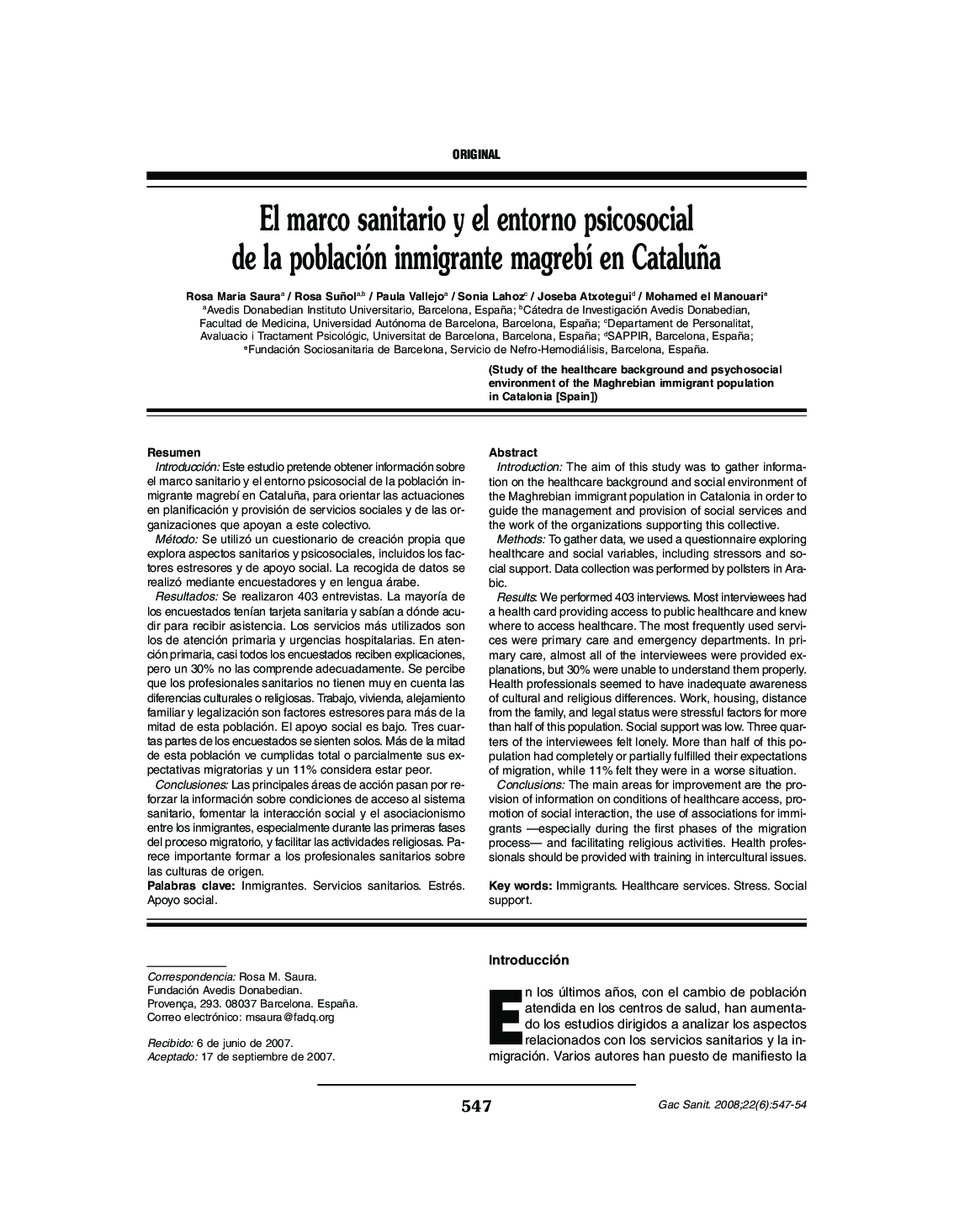| کد مقاله | کد نشریه | سال انتشار | مقاله انگلیسی | نسخه تمام متن |
|---|---|---|---|---|
| 1074302 | 949822 | 2008 | 8 صفحه PDF | دانلود رایگان |

ResumenIntroducciónEste estudio pretende obtener información sobre el marco sanitario y el entorno psicosocial de la población inmigrante magrebí en Cataluña, para orientar las actuaciones en planificación y provisión de servicios sociales y de las organizaciones que apoyan a este colectivo.MétodoSe utilizó un cuestionario de creación propia que explora aspectos sanitarios y psicosociales, incluidos los factores estresores y de apoyo social. La recogida de datos se realizó mediante encuestadores y en lengua árabe.ResultadosSe realizaron 403 entrevistas. La mayoría de los encuestados tenían tarjeta sanitaria y sabían a dónde acudir para recibir asistencia. Los servicios más utilizados son los de atención primaria y urgencias hospitalarias. En atención primaria, casi todos los encuestados reciben explicaciones, pero un 30% no las comprende adecuadamente. Se percibe que los profesionales sanitarios no tienen muy en cuenta las diferencias culturales o religiosas. Trabajo, vivienda, alejamiento familiar y legalización son factores estresores para más de la mitad de esta población. El apoyo social es bajo. Tres cuartas partes de los encuestados se sienten solos. Más de la mitad de esta población ve cumplidas total o parcialmente sus expectativas migratorias y un 11% considera estar peor.ConclusionesLas principales áreas de acción pasan por reforzar la información sobre condiciones de acceso al sistema sanitario, fomentar la interacción social y el asociacionismo entre los inmigrantes, especialmente durante las primeras fases del proceso migratorio, y facilitar las actividades religiosas. Parece importante formar a los profesionales sanitarios sobre las culturas de origen.
IntroductionThe aim of this study was to gather information on the healthcare background and social environment of the Maghrebian immigrant population in Catalonia in order to guide the management and provision of social services and the work of the organizations supporting this collective.MethodsTo gather data, we used a questionnaire exploring healthcare and social variables, including stressors and social support. Data collection was performed by pollsters in Arabic.ResultsWe performed 403 interviews. Most interviewees had a health card providing access to public healthcare and knew where to access healthcare. The most frequently used services were primary care and emergency departments. In primary care, almost all of the interviewees were provided explanations, but 30% were unable to understand them properly. Health professionals seemed to have inadequate awareness of cultural and religious differences. Work, housing, distance from the family, and legal status were stressful factors for more than half of this population. Social support was low. Three quarters of the interviewees felt lonely. More than half of this population had completely or partially fulfilled their expectations of migration, while 11% felt they were in a worse situation.ConclusionsThe main areas for improvement are the provision of information on conditions of healthcare access, promotion of social interaction, the use of associations for immigrants —especially during the first phases of the migration process— and facilitating religious activities. Health professionals should be provided with training in intercultural issues.
Journal: Gaceta Sanitaria - Volume 22, Issue 6, December 2008, Pages 547–554